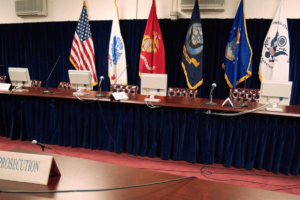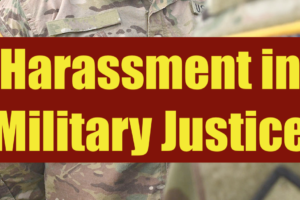
For the Soldier, Sailor, Airman, Marine, or Coast Guardsman that is aware that he is being investigated for sexual assault, an “investigation” can drag on for months and months and even up to a year. Stonewalls and silence are all this “suspect” finds from chain of command and peers alike. By regulation and instruction, uniformed military lawyers cannot be assigned to represent the military suspect. At most, the uniformed counsel is able to sit down with the suspect and give them some basic legal advice about how to behave during the investigation and not to make a statement.
For those suspects whose alleged misconduct happened off base and the investigation was started by the local law enforcement, the length of an investigation can drag on even longer. Decisions about the civilians giving up jurisdiction takes longer than it should and is often the result of poor communication between the civilians and the military authorities. Even if the civilian law enforcement completed an investigation, the military law enforcement, Army CID, NCIS, AFOSI, and USMC CID will review the investigation and inevitably take additional measures. Local law enforcement agencies often do not have the time or resources to do a thorough investigation of the suspect. Military law enforcement has made it a priority to go back into the past of the military suspect and try to interview prior intimate partners; they are looking for a pattern because any prosecutor, defense lawyer, or non-attorney knows that two allegations (or three or four) makes for a much stronger case than the lone voice. Their case will become more than a “he-said / she-said” case; the case becomes “they said,” and the chances for successful conviction increase drastically, especially if the reports of assault are similar and if the complainants do not know each other. In depth investigations of the suspect, even if they yield no fruit other than the original complaint, take an inordinate amount of time, which is compounded by the frequent need to request assistance from other branch offices that do not value the case work because those far away agents feel less urgency about the work.
There are countless ways that a lingering investigation hurts the person suspected because of the administrative “flag” that is placed on him. Among those ways are lost opportunities for a promotion board, losing the opportunity to pin a promotion already earned and being removed from the promotion list, losing eligibility for a special board that gives a new opportunity (such as the physicians’ assistant board), loss of orders to PCS, loss of a unique job, removal from a command position, removal from a leadership position, and receiving a derogatory evaluation that references the allegation as fact.
What is palpable but not quantifiable on any metric is the isolation that a suspect faces from his comrades, superiors, and sometimes, from his loved ones. When I was a military defense counsel at Fort Hood from 2008 to 2010, our office lost three clients to suicide. Two were pending courts-martial and one was pending non-judicial punishment. One of the court-martial clients had made suicidal ideations and even attempted to take his own life on one prior occasion; the trial counsel saw fit to draft a charge that was preferred by his commander for damage to government property (the Soldier himself) for attempting suicide and injuring himself. Let that wash over you. Another Soldier was damaged and broken from years of combat deployments and became severely addicted to crack cocaine; he was an E-8 with 22 years of service. He drove his vehicle at a high rate of speed. Right into a tree. The Soldier facing non-judicial punishment was my client; when I realized about three minutes into our consultation that I could made his NJP go away because I could have the entirety of the evidence excluded, I made a quick phone call to secure the dismissal and rushed him out the door. He killed himself by hanging two days later. That Soldier’s NJP was not his issue; the NJP was merely a symptom of the isolation he felt.
One of the most rewarding parts of service is the camaraderie that servicemembers enjoy as an automatic byproduct of wearing the uniform. You join a group of people that all give a part of themselves to a higher and better purpose. When peers, superiors and subordinates view a person as having failed the values of service by merely the onset of an investigation, they quickly cast aside that suspect. The fall proves for some unbearable.
There is no greater isolation than the one that follows having felt the warmth and togetherness of a brotherhood in arms.
Aside from analyzing the legal chessboard that inevitable upcoming litigation represents, an attorney becomes for many a suspect his lifeline to a feeling and sense of belonging. It is no mistake that lawyers are also known as “counselor.” Most, if not all of my clients, tell me at one stage or another that they are so grateful to me for being in “their corner,” for “fighting for” them, instead of against them, and for not making them feel like they are already guilty. An investigation is for suspects the longest waiting period they will ever endure; some literally cannot bear it. Despite the Department of Defense’s campaign for suicide prevention, a military accused is precluded from obtaining mental health from off base providers. Many military accused do not trust providers on post so the net result is servicemembers under agonizing stress, abandoned by their units, made to feel guilty before innocent that are unable to obtain mental health support.
Some suspects seek early representation by civilian counsel to ensure that someone is on their side. No one should be made to feel alone, but not all civilian defense counsel are equally qualified. Call or send an email to set up a consultation.
You Might Also Like These Articles Are you in the military and are you getting into trouble for UCMJ or NJP Well, if you are, you… How Can I Win at a Court-Martial? If you find yourself the target for military prosecution and are facing a… More and more we get calls and questions about what harassment in the military is. The cynic in me is…






 REQUEST A CONSULTATION
REQUEST A CONSULTATION 